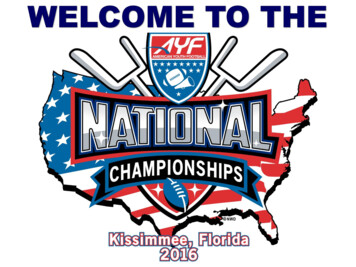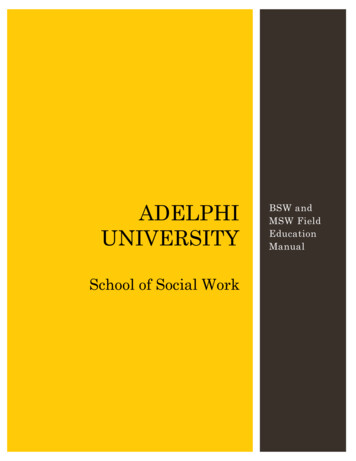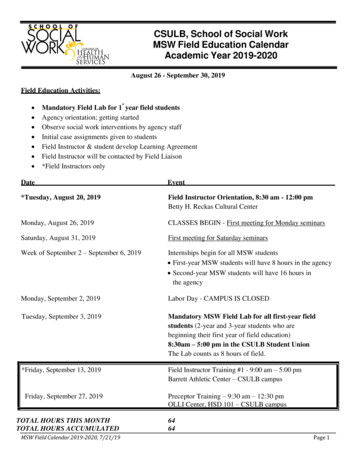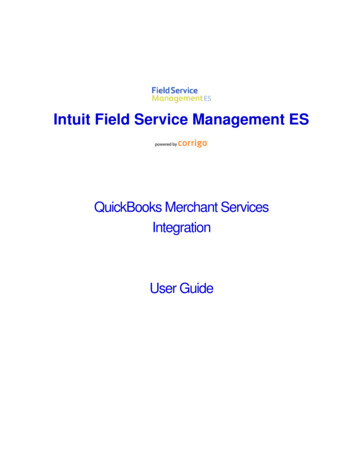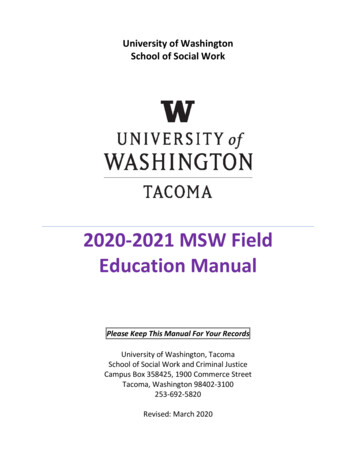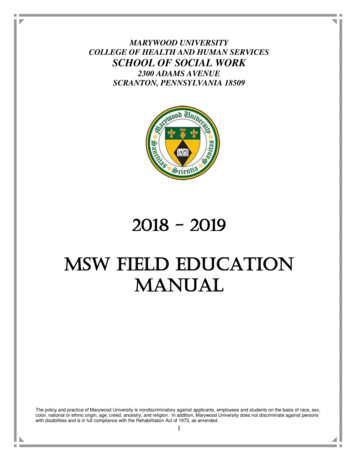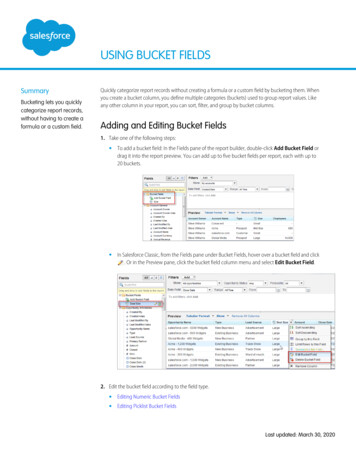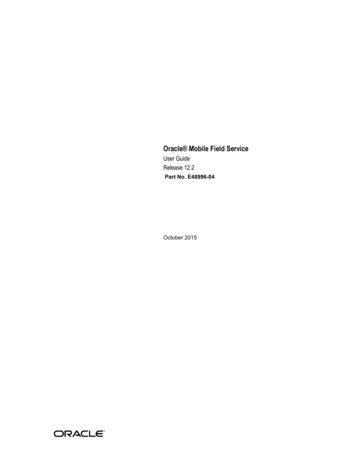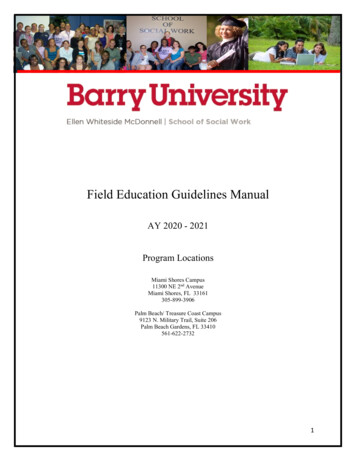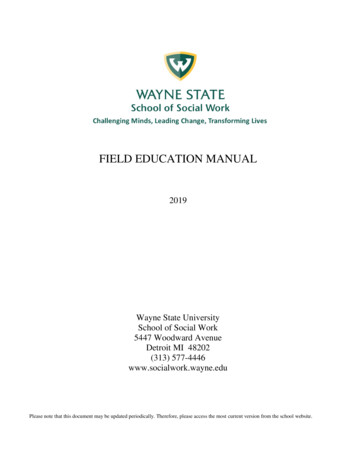
Transcription
FIELD EDUCATION MANUAL2019Wayne State UniversitySchool of Social Work5447 Woodward AvenueDetroit MI 48202(313) 577-4446www.socialwork.wayne.eduPlease note that this document may be updated periodically. Therefore, please access the most current version from the school website.
TABLE OF CONTENTSI. IntroductionA. Mission StatementB. Non-Discrimination and Equality-of-Opportunity PolicyII. Overview of Field EducationA. Objectives of Field Education1. Importance of Field EducationB. Field Education and the Urban MissionC. Organization and Coordination of Field EducationD. Office of Field EducationE. Professional StandardsF. Technical StandardsG. Field Education Health Clearance PolicyH. Frequently Asked QuestionsIII. Roles and Responsibilities of Involved PartiesA. OverviewB. Professional ConductC. Field Placement SiteD. Director of Field EducationE. Placement AssistantF. Faculty Field Liaison1. Faculty Field Liaison VisitsG. Field Instructor1. Field Instructor Seminars2. Field Instructor Meetings with StudentH. Task SupervisorI. Student1. General Responsibilities2. Responsibilities Prior to Beginning Field Placement3. Responsibilities When Doing Field placementa. The NASW Code of EthicsIV. Field Education for Undergraduate Students: Bachelor of Social Work (BSW)A. Goal of the BSW ProgramB. Objectives of the BSW ProgramC. Field Education Requirements for the BSW DegreeD. Senior Year Student Requirements and AssignmentsE. Part-time StudyF. Block PlacementG. Three-day-per-week PlacementH. Place of Employment/Work Site PlacementI. Dual Relationships with agencyV. BSW SyllabiVI. Field Education for Graduate Students: Master of Social Work (MSW)A. Goal of the MSW ProgramB. Descriptions and Objectives of the MSW ProgramC. Field Education Requirements for the MSW Degree2
D. Foundation Year Student Requirements and AssignmentsE. Advanced Year Student Requirements and Assignments1. Innovation in Community, Policy and Leadership (I-CPL)372. Interpersonal Practice (IP)F. Advanced Standing StatusG. Part-time StudyH. Block PlacementI. Three-day-per-week PlacementJ. Place of Employment/Work Site PlacementK. Dual RelationshipsVII. MSW SyllabiVIII. Field Education Placement Policies, Procedures, and ProcessesA. Field Placement Process1. Field Education Student Detail Page2. Field Placement Interview3. Suggested Questions for Field Placement Interviews4. Nature of Field PlacementB. Selection of Field Placement Site1. New Site2. Renewal Site3. Student Intern Job DescriptionC. Change of Field PlacementD. Selection of Field Instructor1. Field Instructor Requirementsa. State of Michigan Social Worker Licensure2. New Field Instructor3. Change of Field InstructorE. Field Placement Policies and Procedures1. No Academic Credit for Life and/or Work Experience2. Academic Calendar3. Attendance at Field Placement4. Criminal History Advisement5. Drug Screening Advisement6. Field Placements Outside the Region7. Field Placement at Agency with Family Member(s) or Client Status8. Offer of Employment by Internship Agency9. Student Participation on School Committees10. Advocacy11. Letters of Reference for Graduating Students12. Extension of Field Placement13. Official Strikes at Field Placement14. Student Use of Private Vehicle15. Student Professional Liability Insurance16. Resolution of Problems Regarding Field Placement1. Corrective Action Plan17.Wayne State University Policy on Student Injuries18. Student Safetya. Risk-Reduction Guidelinesb. Safety Workshopc. Safety Check List3
19. Affiliation Agreement20. Field Placement Clock Hoursa. Verificationb. Requirements for Degree Programsc. Acceptable Activities for Obtainment of Clock Hoursd. Clock Hours and Credit Hours21. Classroom Assignments22. Jury DutyIX. AppendicesA. Place of Employment/Work Site Placement Policy and ApplicationB. Offer of Employment by Internship Agency Policy and ApplicationC. Midterm EvaluationD. Field Instructor Assessment of Student Competencies1. SW 4998: Senior Year2. SW 7998: Foundation Year (First Year)3. SW 8998: Advanced Year (Second Year & Pre-Candidate)E. Safety ChecklistF. Evaluation Forms1. Student Evaluation of Field Experience2. Field Instructor Evaluation of Field Experience4
I. INTRODUCTIONA. MISSION STATEMENTAs a school within an urban research university, the mission of the Wayne State University School ofSocial Work is to transmit, develop, critically examine, and apply knowledge to advance social workpractice and social welfare policy in order to promote social, cultural, and economic justice for thebetterment of poor, vulnerable, and oppressed individuals, families, groups, communities, organizations,and society, by: preparing ethical and competent social work generalists, advanced practitioners, and scholarsat the BSW, MSW, and PhD levels, respectively, with learning that primarily emphasizesurban settings;conducting research, primarily relevant to urban populations; andproviding innovative leadership and service to the urban community and the profession.B. NON-DISCRIMINATION AND EQUALITY-OF-OPPORTUNITY POLICYWayne State University is an equal opportunity/affirmative action institution, committed to a policy ofnon-discrimination and equality in all of its operations, employment opportunities, educational programs,and related activities.This policy embraces all persons regardless of race, color, gender, national origin, religion, age, disability,marital status, or political or sexual orientation, and it expressly forbids sexual harassment anddiscrimination in hiring, terms of employment, tenure, promotion, placement and discharge of employees,admission, training, and treatment of students.Wayne State University complies with the Titles VI and VII of the Civil Rights Act of 1964, ExecutiveOrder 11246 as Amended, Title IX of the Education Amendments of 1972, section 504 of theRehabilitation Act of 1973, the Age Discrimination act of 1975, the Vietnam Era Veterans ReadjustmentAssistance Act of 1974, and Michigan Public Act 453.5
II. OVERVIEW OF FIELD EDUCATIONA. OBJECTIVES OF FIELD EDUCATIONThe Council on Social Work Education, (CSWE) in its Educational Policy and Accreditation Standards,(EPAS) stipulates:Field Education is the signature pedagogy of the social work curriculum. Signature pedagogyrepresents the central form of instruction and learning in which a profession socializes its studentsto perform the role of practitioner. Professionals have pedagogical norms with which theyconnect and integrate theory and practice. In social work, the signature pedagogy is fieldeducation. The intent of field education is to connect the theoretical and conceptual contributionof the classroom with the practical world of the practice setting. It is a basic precept of socialwork education that the two interrelated components of curriculum—classroom and field—are ofequal importance within the curriculum, and each contributes to the development of the requisitecompetencies of professional practice. Field education is systematically designed, supervised,coordinated, and evaluated based on criteria by which students demonstrate the achievement ofprogram competencies.In addition, the Field Education program is committed to:1. preparing competent practitioners to address the needs of vulnerable populations and personsfor whom the quality of life is threatened;2. preparing practitioners to provide social work services at the entry level (BSW) to address theneeds of clients and populations in their transactions with the environment; and3. preparing practitioners who practice at the advanced level (MSW) and integrate their analyticand practice skills with areas of social concern.Achieving these objectives requires that students be placed in agencies and settings where they will havewell-structured assignments and consistent field instruction. The BSW and the MSW field educationcurricula state the objectives and describe the content to be learned at the field placement.1. IMPORTANCE OF FIELD EDUCATIONField education is an integral part of the social work degree curriculum, and is required of allstudents in the BSW and MSW programs. Field placements allow students to create,practice, and strengthen skills needed to become effective workers through immersion in aprofessional social work environment. CSWE requires colleges and universities offeringaccredited social work degrees to provide students educational instruction and opportunitiesin five areas: human behavior, policy, practice methods, research, and field education/work.B. FIELD EDUCATION AND THE URBAN MISSIONThrough its urban mission, the school aims to prepare practitioners to serve those who are affectedadversely by the conditions and problems endemic to urban societies and those oppressed by virtue oftheir race; ethnicity; sexual orientation; mental, emotional, and/or physical challenges; religious beliefs;place of national origin; gender; or socio-economic status.6
Therefore, it is the policy of the school to require that all students have at least one field placement in theCity of Detroit, the Detroit metropolitan area, or in another urban setting capable of providing fieldeducation serving those who are oppressed, vulnerable, and/or disenfranchised.C. ORGANIZATION AND COORDINATION OF FIELD EDUCATIONThe school develops objectives, curricula, policies, standards, and procedures for field education. TheDirector of Field Education is primarily responsible for administering and managing the program and fordirecting Office of Field Education (OFE) staff members who organize and coordinate field educationexperiences. The Field Education Advisory Committee, (FEAC) composed of faculty, agencyrepresentatives, and students, is a consultative body to the director, who chairs the committee.D. OFFICE OF FIELD EDUCATION (OFE)The OFE oversees the placement of BSW, MSW and PhD students at community agencies where theyperform field placement; field education is one of the five educational areas required by CSWE foraccreditation. The OFE employs staff to organize and arrange field placement opportunities for studentsin both the BSW and MSW programs. The Director of Field Education supervises the day-to-dayfunctions of the OFE, and staff within the OFE includes an assistant to the director, three part-timeplacement assistants, a full-time secretary, and a student assistant.Field placement is the component of social work education that helps students integrate classroomlearning and reinforces course content. The OFE strives to ensure that students are placed at sites thatprovide meaningful opportunities to grow and learn. In addition, the OFE is responsible for assigningFaculty Field Liaisons and educating field instructors.E. PROFESSIONAL STANDARDSThe social work profession demands of its practitioners a commitment to professional responsibility andthe demonstration of appropriate interpersonal and ethical behavior. Therefore, the academic curriculumof the Wayne State University School of Social Work requires that all social work students maintainprofessional behavior in accordance with the National Association of Social Workers Code of Ethics andthe following Professional Standards. Failure to comply with these standards constitutes academicmisbehavior under the Wayne State University Student Code of Conduct and could result in a student’sdismissal from the academic program.Integrity: Students must behave in an honest and trustworthy manner with respect to all duties performedin connection with their field placements. This includes representations made in the initial application forplacement, work conducted at the field placement, and all other representations made in field relatedassignments or at field related meetings.Communication: Students must exercise professional judgment in all communications with otherstudents, faculty, staff, clients, and other professionals.Dress: Students must dress professionally and in a manner appropriate for their field placements. Ifstudents have questions about the dress requirements of their field placements, they should contact theirassigned field instructor.Confidentiality: Students must comply with all applicable ethical and legal standards for privacy andconfidentiality as they relate to any and all communications made in connection with their fieldplacements.7
Attendance: Students must meet the attendance requirements of their field placements. This includesarriving at their field placements on time and working at the placements the whole time they arescheduled to work. This also includes prompt and reliable attendance at all other field related meetingsand ancillary obligations.Performance in Field: Students must actively engage in their field placements. This means that they mustadequately prepare for the placement, consult with and follow the directions of their field instructors, andcomplete responsibilities consistent with their curricular year in accord with the specific requirements oftheir placements. If students have questions regarding their responsibilities, they must consult with theirassigned field instructor and/or their faculty field liaison.Self-awareness: Students must demonstrate the appropriate use of self-disclosure and exhibit knowledgeof how personal experiences and values affect practice.Self-regulation: Students must demonstrate emotional and behavioral regulation as well as unimpairedjudgment in decision- making.F. Technical StandardsThe academic curriculum of the Wayne State University School of Social Work requires thatsocial work students meet the following technical (minimal procedural) standards with orwithout reasonable accommodations.I.Communication Skills: Students must have the ability to communicate effectively orallyand in writing when working with students, faculty, staff, clients, and other professionals.II.Intellectual Capacity: Students must have the ability to discuss and process information ina matter that is satisfactory based on the particular demands of their field placements. Inaddition, students must be able to think critically, analyze and interpret objective andsubjective data, and apply effective problem solving skills while working in their fieldplacements. Students must demonstrate the cognitive ability to effectively use and applythe program’s competencies.III.Physical Capacity: Students must be able to meet the physical demands of their fieldplacements, including demands relating to the use of sensory and motor skills.IV.Technological Skills: Students must be able to use the technology required to work attheir field placements and complete all related assignments. This technology couldinclude, but is not limited to, the use of computers, telephones, and agency databases.Students who would like to request reasonable accommodations to assist them in meeting thesetechnical standards should contact Student Disability Services:5155 Gullen Mall1600 Undergraduate LibraryDetroit, Michigan 48202Phone (313) 577-1851 or studentdisability@wayne.edu8
G. FIELD EDUCATION HEALTH CLEARANCE POLICYThe School may require students in field placement to obtain assessments of their physical or mentalhealth from health or mental health professionals approved by the School. The School of Social Workreserves the right to refuse to place or direct a student in field education if the physical or mental healthstatus of the student indicates such action is warranted in order to safeguard clients, agencies, the student,other students, or the School.H. FREQUENTLY ASKED QUESTIONS1. What is the process for obtaining a field placement? What does the OFE do with my questionnaireand other requested placement materials?BSW, MSW and PhD students receive an email containing login information for the InternPlacement Tracking System, IPT, via the Wayne State University email system beginning no laterthan one semester prior to the start of field placement. Students complete the Student Detail Pageand upload a current resume following the instructions and guidelines given. The Student Detailpage helps students to identify interest areas and preferred agency settings. Please note, no fieldsite is guaranteed to any student. The OFE placement staff considers each student’s interests,goals, and background to determine which agencies match a particular student’s preferences.However, placement matches are ultimately based upon student curricular year and availability ofan agency. MSW Advanced year students are also matched to agencies based on theirconcentration, so students planning to change concentrations or interest areas must do so beforebeing assigned to a field placement. Students are urged to refer to the Concentration/Curriculumbooklet for information on concentrations and are also encouraged to meet with the assignedacademic advisor to review individualized plans of work.Please note students are NOT to contact potential field placement sites regarding field placementopportunities. If a specific field placement site is of interest a student must notify the Office offieldEducation and appropriate contact will be made as the School must ensure specific criteria aremet.2. Can I ensure that I get my first placement choice?The OFE tries to place students in their preferred or similar agencies, but cannot makeguarantees. The OFE considers many factors in placing students, and often compromises must bemade.3. What if I don't have a car?Lack of access to a car may severely limit field placement options because many agencies arecommunity based and may require students to perform field assignments that involve outreach,home visits, and community work. Students without cars may have to compromise their intereststo be accommodated where public transportation is available. During inclement weather, allstudents should allow extra time for travel to and from field agencies.4. Can I have a placement in the town where I live?Depending upon the availability of appropriate placement opportunities, the OFE tries to placestudents near their homes. Students will always attend classes on Wayne State University9
campuses. The school requires that all students have at least one field placement in the City ofDetroit, in the Detroit metropolitan area, or in another urban setting that provides an opportunityfor field placement which serves those who are vulnerable, oppressed, and/or disenfranchised.5. Can I do my field placement at my current place of employment?Possibly. This is called a Place of Employment or work-site placement, and some students areeligible for this arrangement. Students interested in doing their field placement with their currentemployer must submit an application to the Office of Field Education describing the agency, itsprograms, the position held and duties, the work schedule, and the name and title of theappropriate supervisor(s). The application and policy for work site placement are available fromthe OFE. All applications are considered on an individual basis and the final decision rests withthe OFE.6.Can I arrange my own field placement?No. While the OFE is always interested in new field placement sites and encourages suggestionsfor field placements from students, all field placements must be arranged by the OFE. Studentsare asked NOT to contact agencies to arrange field placements. Agencies must have a newagency field placement application on file and have an individual available to provide supervisionin accordance with School standards. All application material for field placement sites isavailable from the OFE.7.Can I be placed at an agency that is not currently approved by the school?Yes. If the agency meets the school's criteria for an approved field placement site, as determinedby the OFE, and has an approved application on file, then the site can be used for field placement.8.How much time should I reserve for field placement each term?The chart below explains the clock hour requirements for students in field placement.Hours per weekWeeks per semesterSemestersTOTALclock hoursTotalCreditsBSW Seniors1614.5246010BSW WOW Seniors1614.5246010MSW Foundation Year1614.524508MSW Advanced Year16 or 24*14.52450 or 676*8 or 12*Year*Only Advanced Year MSW students (traditional or advanced standing) may opt to do Field placement for 24 hours each weekinstead of the traditional 16. This is often called a "three-day placement" and is an option for students in place of some electivecredits.Students are expected to have regularly scheduled field days when their supervisor is on site, andfield days should be 8-hour days. MSW Advanced Year students should consult their academicadvisor prior to selection of additional credits in field. Because it is difficult for students to work10
full-time, take classes, and do field placement, students are encouraged to reduce theiremployment to no more than 20 hours per week. If they are not able to do this, they shouldconsider the school's part-time option. Students should discuss all scheduling arrangements at thefield placement interview prior to beginning field placement. For BSW students, the ratio ofcredit hours to clock hours is 1:46. For MSW students, the ratio is 1:56.25Please note: part-time students have the same field placement requirements as full-time students.The course work is simply extended over a longer period of time.9.Can my placement be arranged for evening and/or weekend hours?Most likely not, as students need to be in field during normal agency business hours for aminimum of 2 days, 16 clock hours, per week at times when their field instructor/task supervisoris also on duty and available for supervision.Students in both the full-time and part-time BSW and MSW programs are expected to meet thesame field placement requirements within the specified time allotted.10. What are the main differences between the Foundation MSW program and the MSW program withAdvanced Standing status?Students in the Foundation Year MSW program are able to complete the MSW degree in 2years for full-time students or 4 years for part-time students. These students do not hold aBachelor of Social Work degree from a CSWE-accredited school and must complete two fieldplacements.Students in the MSW program with Advanced Standing hold a Bachelor of Social Workdegree from a CSWE-accredited school and are able to complete the MSW degree in 10 monthsfor full- time students or 2 years for part-time students. These students complete one fieldplacement as part of their advanced curriculum.11. Can I enroll in more or fewer credits of field placement than the number required?No. Students must register for only the identified number of credit hours for the program in whichthey are enrolled. All students must have a plan of work which identifies the number of credithours for all courses, including field placement. Students in the advanced year of the MSWprogram have the option of either a two-day (4 credits per semester) or three-day (6 credits persemester) field placement. Once this choice is made, it CANNOT be changed.12. What is the difference between an academic advisor, a Faculty Field Liaison, and a field instructor?An academic advisor is a member of the school’s academic staff who advises students onacademic matters, typically including course planning and registration.A Faculty Field Liaison is assigned by the OFE to the agency in which a student is placed. TheFaculty Field Liaison is either a full-time or a part-time faculty member who monitors and gradesthe student’s field placement performance. The Faculty Field Liaison also provides assistance andfeedback to the student at the agency and mediates placement-related issues, including any thatmight occur between the student and the field instructor.11
A field instructor is a Masters-level Social Worker (LMSW) with 2 years post-MSW experienceand is eligible for licensure in the State of Michigan or another qualified individual identified bythe WSUSSW. The Field Instructor is an agency staff member, or affiliate, who supervisesstudents at the field placement agency. The field instructor also evaluates students and providesfeedback to the Faculty Field Liaison for grading.13. How do I find out who my Faculty Field Liaison is and how do I contact him/her?At the start of the term, Faculty Field Liaisons are assigned to work with agencies based on theirscholarly interests and other preferences. Although we try to maintain continuity, Faculty FieldLiaison assignments may change because of sabbaticals, other leaves, or other academiccommitments. At the start of the semester, students will be able to access the assigned FacultyField Liaison via their Student Detail Page on the Intern Placement Tracking System, IPT. Thisinformation will include contact information- email and phone number. If you have any questionsabout your Faculty Field Liaison assignment, check with the OFE.14.What if my agency is not what I expected or is not meeting my learning goals?Our policy is that traditional BSW and MSW students in field placement must be at the sameagency for a minimum of two consecutive terms. Once you have started field placement, youshould discuss any placement-related issues with your Faculty Field Liaison. Any decisions aboutwhether a student should be re-assigned to another agency must be made by the Faculty FieldLiaison, the field instructor, and the student, in consultation with the Director of Field Education.Students sometimes request a change of placement for one term only. Generally, agencies cannotaccommodate students for only one term nor are one-term placements sufficiently beneficial to astudent’s education experience. Agencies cannot provide substantial assignments nor invest intraining a student who will leave the agency after one term.Also, brief field placements for MSW advance year interpersonal practice students make itdifficult to establish client rapport and develop working relationships.15.Can students interview at multiple sites before deciding on a field placement?While the OFE works hard to offer students choices in agency selection, allowing multipleinterviews for over 600 students enrolled in the BSW and MSW degree programs would make itless likely for students to be placed at their preferred sites. Competition for sites among ourstudents and those of other neighboring schools is high, and agencies tend to select students withthe most work experience. Our policy protects students with less work experience, and allows theOFE to offer more individual attention to students. It also ensures that all students are placed asquickly as possible. If the student or field instructor believes that the match is not suitable, thestudent will have the opportunity to interview at another agency, a process that continues until thestudent is successfully placed, unless it is determined that the student is not ready for fieldplacement at that time.16.Do agencies offer stipends to students?We strongly encourage agencies to provide stipends; however, policies vary and the decision isentirely up to the agency. Stipends are usually quite small. Sometimes agencies offer stipends toencourage a larger time commitment or to make the placement more attractive. Sometimesagencies fund modest stipends through grants.12
17.Do agencies hire students when they graduate? If so, which agencies?Yes. Students are occasionally hired by their field placement sites following graduation, but thereis no dependable pattern of which agencies do this. However, the Office of Admissions andStudent Services is happy to offer employment assistance18.What are the procedures for making up missed field placement days?All absences from field placement MUST be made up. Students who miss field placement days,or who start field placement late, should have a plan to make up the hours missed in their fieldplacement learning plan, which must be developed with the field instructor and approved by theFaculty Field Liaison. The learning plan may also include strategies for fulfilling field placementclock hours such as working evenings, weekends, or during school breaks.19.Should I disclose my intern status at my field placement agency?Yes. Unless the agency has a policy dictating otherwise, students should disclose intern status inan appropriate manner at their field placements.20.Why is there a fee for field?The university and the school require liability insurance coverage before a student begins fieldplacement to cover any incidents that occur at the field site for which the student may beimplicated. SocialWork students will be covered under a universal policy purchased by the School of Social Work.Your field fee will go towards this purchase.21. What happens if I do not disclose information related to ANY history or current legal interactions?Students are being asked to provide honest responses of prior or current legal interactions.Examples of these may include, but are not limited to: a misdemeanor, felony, excessive citations,arrests, revocation/suspension of license, child or adult protective services clearance involvement,and any other information that may appear on a background check. Failure to comply may resultin a referral to the Professional Review Committee for review and sanctions.13
III. ROLES AND RESPONSIBILITIES OF INVOLVED PARTIESA. OVERVIEWMain Purpose:Relationship WithStudent:Relationship WithSchool:Example of WhenContact Would BeAppropriate:Field PlacementSiteTo serve as the physicalfield placement locationTo offer a facility inwhich the student canpractice and developskillsTo offer a facility inwhich the school canplace the student topractice and developskillsStudent is at the fieldplacement site 2 daysper week for 8 hoursper dayDirector of FieldEducationTo provide direction,organization andmeaningful purpose tofield-educationexperiencesTo guide all parties andoversee placement sitesto ensure properexperience is gainedTo coordinate andsupervise the OFEStudent speaks with theFaculty Field
Sep 04, 2019 · The BSW and the MSW field education curricula state the objectives and describe the content to be learned at the field placement. 1. IMPORTANCE OF FIELD EDUCATION Field education is an integral part of the social work degree curriculum, and is required of a
